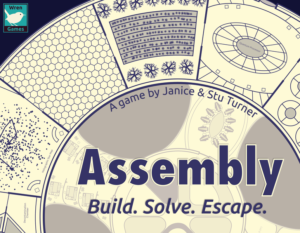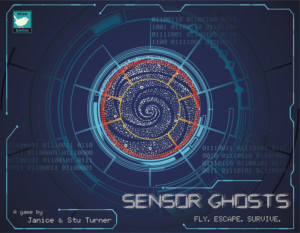- Learning time
- 20 minutes
- First play time
- 20 minutes
Lux Aeterna
Designed by: Tony Boydell
The Lux is headed for a black hole, all systems down, and as the sole occupant you have ten or fifteen minutes to save yourself. Can you do it?!?
That’s the challenge of Lux Aeterna, which can end in one of five ways, and only one of them desirable: get at least three of the six systems back online to win, or lose by running out of time, systems, cards, or space – when you are sucked into the event horizon.
The cards are Lux’s currency. Six of them denote the temporarily-down systems, each with a die to show it’s current operational state: all the dice start at a value of 2 but over the course of the game will fluctuate – if they hit zero that system is beyond repair, and if a fourth system goes down completely, it’s an instant loss. Conversely if you get the value ‘above’ six, then the system is now operational again and gives you a little fillip as a result.
How to manipulate these numbers then? Most of the cards are main deck cards. Drawing just four such cards on each turn, you assign them to three actions (Event, Action, Move) and one save-for-later (the Cache). The event is used to manipulate the dice values on the system cards, the action has a negative (or nil) effect on them, and the move value pushes your ship ever onward towards your potential doom. Main deck cards have different values that apply to different systems, so taking your time over the these decisions is critical to how well you’ll progress, or not. Unfortunately when your ship’s in the grasping clutches of a black hole, time’s not on your side: Lux Aeterna demands that – once familiar with the game’s mechanics – you play with a timer. It may seem like rubbing salt in the wound, but Lux’s time constraints are a key part of the construct, forcing you to take decisions quickly under stress.
To add to the general pressure-cooker ambience, there’s also glitch cards in the main deck that cause additional mischief, hampering your efforts, and when any system collapses entirely, there’s a negative effect that can, at times, feel catastrophic. It’s only a fifteen minute game at most, but manages to confect a convincing race-against-the-clock with no board, and your only friend in space the flighty fall of cards.
The guru's verdict
-
Take That!
Take That!
There's no other players, so although the Take That quotient hovers around 99%, it'd be hard to take offence.
-
Fidget Factor!
Fidget Factor!
Absent.
-
Brain Burn!
Brain Burn!
If you like, you can play without the timer and have an almost-serene experience of every round representing a miniature puzzle. We'd never sneer at house-ruling any game. But it's meant to be played as high-tempo, against-the-clock, and doing so ups the brain-burning. All you're doing is allocating two number values and one event, essentially, but every decision has ramifications for the others.
-
Again Again!
Again Again!
Lux doesn't vary hugely from play to play - like a nightmarish Groundhog Day, you're always back in the same starting position, tasked with saving your backside from stretching into infinity. But if you get the itch to do so, there's plenty of variability within the set up, with different system cards, different glitches, different lengths of time as a challenge, and of course the main deck cards falling with inevitable hair-wringing frustration...















Sam says
Lux Aeterna hasn't ousted Assembly as my favourite short solo game of probably-doomed-in-space, although that's an admittedly small niche. Assembly set the bar high though, and Lux is not so far away. Those who relish the real-time pressure Lux employs will probably prefer it, in fact, as with the seconds ebbing away there's a tension present Assembly can't match. I'm often impressed with how much play designers can pack into a tiny box and Lux certainly does that. If you beat the odds, the challenge can be tightened up with more glitches, giving yourself less time, or both.